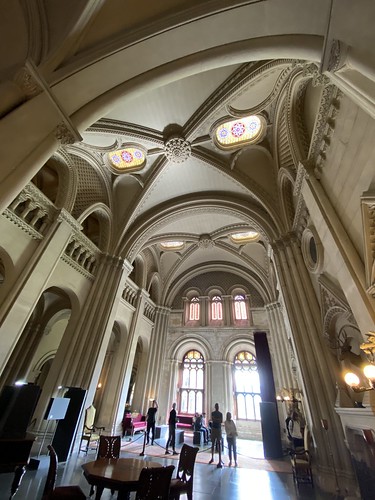We spent much of yesterday at Penrhyn Castle, having spotted it from across the Menai Strait when we visited Beaumaris earlier in the week. It's not the kind of castle that you'd expect for North Wales, as it is nothing to do with Edward I and his pacification of the Welsh. Instead, it's a stately home constructed in the style of a castle, now owned by the Nation Trust.
I came away with a feeling of unsettled ambiguity, and perhaps a little anger.
Although there has been a home on the site since the 1400s, the huge and ambitious mansion that exists there was born from money raised in the Caribbean from sugar plantations and from Slate Quarries in North Wales.
 |
| The Great Hall |
This was the first National Trust site that I'd visited since they decided to more openly address the links between colonialism and historic slavery at their properties. That was a decision which was openly challenged by those on the right of politics who added it to the 'Culture War' and divisiveness that they like to stir up. The National Trust's position was endorsed by the Charity Commission.
In some parts, it was just a subtle change of the way that signs read. Rather than just say 'Penrhyn Castle was funded by the families wealth from sugar plantations in the Caribbean', they've changed to 'Penrhyn Castle was funded by the families wealth from sugar plantations using enslaved people in the Caribbean'. Simple. Matter of fact. But recognising the truth of the history.
They'd also done a project with children from the local primary school, exploring the links to colonialism, Empire and slavery with kids from all backgrounds. Some of the material was powerful.
An Osiris statue from Egypt had this poem from Fatima (11).
He had money and I had history.
His money bought my history.
A simple, stark reminder of the relationships within Empire.
 |
| Beautiful carvings paid for with the lives of others |
A box. The Jamaica Box. Containing records of the plantations the family held.
Let's think beyond the box.
Lock it. Hide it. Shelve it.
Darkness conceals the light which exposes
Questions flowing through
the cracks in the corners.
Words from the Penrhyn Staff, on how easy it is to hide the past away when it's inconvenient.
We live on the proceeds of Empire. Of colonialism. Of slavery. Our economy and place in the world is built on the ravaging of India's riches by the East India Company. On wealth from sugar and cotton grown on the back of slavery. On money taken from the Opium trade in China. It's part of who and what we are, and failing to recognise it diminishes us.
I mentioned anger at the start.
The letters from the family and other anti-abolitionists arguing the case for slavery and that the journey across the Atlantic from Africa was the best thing to happen to the people taken as slaves. The cases made that slavery was common in Africa and so a natural and normal state, combined with the argument that the people so taken were being saved from brutality.
The letters from the Quarry workers and townsfolk commending the family publicly. The painting of work at the quarry - the source of the family's ongoing wealth - that was put were the family couldn't see it when 2,800 workers went on strike at the Quarry for better conditions and were locked out for three years from 1900.
A family history steeped in oppression and exploitation of others for wealth.
A family recognised for good works.
I came away thinking about our history in a way I haven't before, embraced by ambiguity and complexity, with an undertow of anger about the way that people were treated and a feeling that such exploitation can never be justified.
I suspect that I'm still thinking about it a day later and writing a blog post about how impactful I found it means that the National Trust has succeeded in their aims to explore the parts of our history often glossed over.
18 August 2022


No comments:
Post a Comment